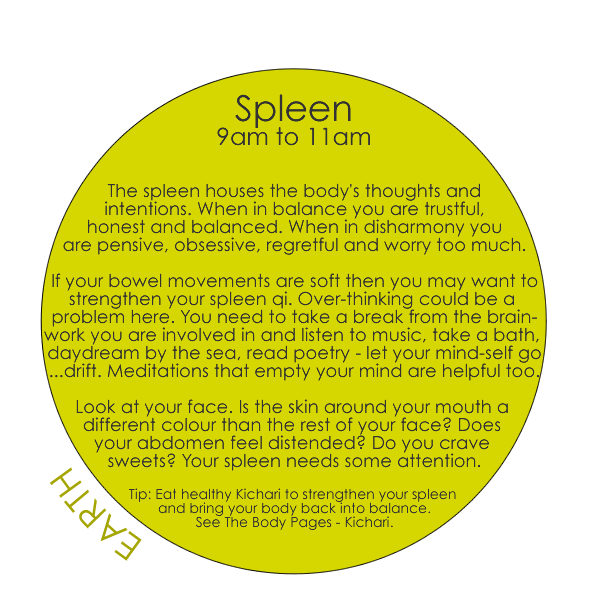

Spleen
•Emotions: Worry, dwelling or focusing too much on a particular topic, excessive mental work.
•Spleen Function: Food digestion and nutrient absorption. Helps in the formation of blood and energy. Keeps blood in the blood vessels. Connected with muscles, mouth, and lips. Involved in thinking, studying, and memory.
•Symptoms of Spleen Imbalance: Tired, loss of appetite, mucus discharge, poor digestion, abdominal distension, loose stools or diarrhea. Weak muscles, pale lips. Bruising, excess menstrual blood flow, and other bleeding disorders.
•Spleen Conditions: Spleen Qi Deficiency, Spleen Qi Descending, Spleen Yang Deficiency.
What Is Spleen Qi Deficiency?
Spleen qi refers not only to the actual organ called the spleen but to the entire digestive system and aspects of the circulatory system. Ordinarily, when the spleen qi is flowing properly, the digestive system also functions properly. Blood and all the fluids of the digestive system move smoothly, and there are no backups or sagging of the organs.
When the qi is blocked as a result of dampness, however, a number of symptoms can develop. Many of these symptoms relate to appetite and weight; others to fatigue and pale skin. Western diagnoses associated with spleen qi deficiency include ulcers, gastritis, chronic fatigue, AIDS, chronic indigestion, and hepatitis.
Causes of Deficiency
According to Chinese Traditional Medicine, the spleen prefers a dry environment. Thus, dampness can cause issues with the spleen qi. For example, living in a damp climate or eating cold or raw foods can cause spleen dampness.
Symptoms
•Weakness, lethargy
•Pale, bright face
•Shallow breathing
•Low, soft voice
•Little desire to speak
•Poor appetite
•Prolonged headache
•Fatigue
•Loose stools
•Lethargy
•Dizziness
•Tired eyes
•Dislike cold greasy foods
•Headache after exertion
•Symptoms are worse in the morning
•Abdominal discomfort which feels better when pressure is applied
•Indigestion
•Bloating and gas
•Weak limbs
Tongue Appearance
Pale or normal tongue. May have swollen sides.
Pulse
Weak pulse
Related Conditions
•Gastric or duodenal ulcer
•Dyspepsia
•Hepatitis
•Anemia
Herbs That May Help
These are just some of the herbs that are believed to help spleen qi deficiency:
•Codonopsis
•Ginseng (part of the traditional tonic called Four Gentlemen decoction)
•Astragalus
•Jujube Dates
Foods to Strengthen the Spleen
•Beef
•Root vegetables
•Warm foods
•Soups
Warming spices, such as black pepper, ginger, cumin
Of course, if you experience symptoms such as those described above, it is important to visit a physician to develop a proper course of treatment.
While herbal remedies may be helpful for mild discomfort, issues such as ulcers, anemia, and hepatitis are very serious and can even be life-threatening if not medically managed.
Stomach Heat
Traditional Chinese Medicine (TCM) Pattern of Illness
Symptoms of Stomach Heat
•Burning in the epigastrium

⇧The epigastrium is the area of central abdomen lying below the sternum and above the umbilicus. ⇩
•Thirst, especially for cold drinks
•Frontal headaches
•Crave cold drinks and food
•Gum swelling, pain, or bleeding


•Constant hunger
•Constipation
•Nausea or vomiting
•Sour regurgitation
•Stomach discomfort or ache
•Dry mouth or lips
•Food stagnation
•Sour regurgitation
•Loss of appetite
•Fullness and distension in epigastrum relieve by vomiting
•Foul breath
•Insomnia
Tongue
Red tongue with dry, thick, yellow coating
Pulse
Pulse full, slippery, fast
Herbs Used For Stomach Heat
◾Deglycyrrhinated licorice root
◾Peppermint
◾Longan berries
Foods Used For Stomach Heat
These are just some of the foods that are believed to help stomach heat
Bitter endive
Spinach
Strawberry
Banana
Buckwheat
Mung bean
Cucumber
Since symptoms of imbalances in alternative medicine may be linked to a number of medical conditions, it's important to consult your physician if you have any health concerns. Self-treating a health condition and avoiding or delaying standard care may have serious consequences.

No comments:
Post a Comment